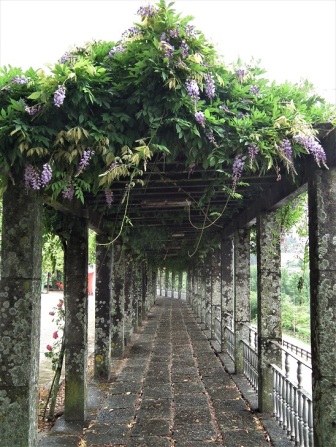The drive east was curiously autumnal for the second day of summer. The heavy overnight rain had turned to drizzle and the clouds were touching the road. More autumnal than anything else, though, leaves on many trees were already turning red. Not enough water in the soil, said the missus sagely. Big cork trees loomed up out of the murk on the bendy road. Great dripping ferns leaned out from the banks. I never attempted to get above third gear.
The weather being what it was, we had decided to have lunch not too far away and in town. The only choice was which town. Going west or south would quickly have brought us to semi-urbanised areas and we both wanted to stay rural. East won because the roads that way are prettier than going north. The fact that we couldn’t see the roads because of the mist made that a particularly academic exercise in making choices. We headed for Celorico which is our ‘home’ town on account of it being the heart of ‘our’ concelho even if it isn’t the nearest town to our house. As the missus always tells me when we head that way (which is frequently) Celorico is a poor town in a poor district. As we tell each other, we have a soft spot for the town, warts and all.
It was the missus’ turn to choose the venue and Restaurante Adelina was our target. The food came very highly recommended, she said. Tucked behind the courthouse, the dining room is on the first floor of a suitably solid piece of nineteenth century granite house building but with doorways more suited to the sixteenth century, if height of the door frame was to be a measure. I skimmed my skull a couple of times, my thinning hair barely any protection at all these days. The dining room was half full and, as we breezily reached the top of the stairs into the room, all heads turned to look our way. I assumed that our presence had induced a hushed reverence but I soon realised that the hushed state was simply a reflection of the torpor which seemed to hang over the place. For some reason, pink was the colour chosen for the under-cloths on the tables and for some drapery on the wall. It was quite a dark, dusty pink and it gave the room the feel of a place that had been frozen in time in about 1962. I half expected young women in beehive hairdos to arrive in petticoat-stiff frocks, with young men sporting oiled quiffs and drainpipe trousers and to order frothy coffees and put a tanner in the juke box. I don’t know if I was relieved or saddened by the fact that they didn’t turn up at all.
A lugubrious air settled quickly again on the assembled diners and even the arrival of a young child in a tantrum didn’t lift the mood. The owner, a cheery woman named Adelina (we supposed) who had a bright manner, sparky voice and beaming smile was unable to dispel the heaviness in the air. She retreated back to the kitchen. The young Eeyorish waiter carried gloom with him as well as plates of food and he managed to ladle despondency on every table he waited on, a melancholy dish which seemed welcome at all the table except ours. Oh dear, we thought. Perhaps this was a bad choice.
We had rung ahead and ordered roast goat. We were celebrating going out. The platter arrived with an enormous portion of meat and roast spuds and, shortly after, a bowl of rice appeared as well. As an afterthought, the sombre young man asked if we wanted a salad. I could have done with some grelos or couve but we would take what we could. Ironically, the previous week I had had Sunday lunch in a gastro-pub in Wales where I was bewailing the excess of veg served with roast dinners these days in British eateries (come on, seven different veg?) and here I was bemoaning the opposite. Something in between, guys? But the food that was served? Well, we have hardly ever eaten better, anywhere. Just about everything was as perfectly prepared and cooked as it is possible to be and, though it took us some considerable time, we managed to finish the entire works in front of us, bar half the rice. When the bright woman from the kitchen came to ask how the meal was, I ran out of superlatives. I know I used mesmo a lot.
It was the missus’ turn to pay so, naturally, the bill was cheap. Too cheap, we thought. I don’t see how they could have bought the meat (let alone anything else, and prepared it all) for the price they charged. We left Restaurant Woebegone before they discovered their mistake.
A little wander around our frequently overlooked vila before heading home. It  always cheers us up – though the food had already done that, in spite of the surroundings. Over the years, Celorico has worked hard to make the most of its hidden charms. It had its work cut out. When I first visited some twenty something years ago, it was a very run down and forlorn little place (a mirror of what we’d left behind at the restaurant) but some talent and ingenuity has been applied and the results are a pleasant little place to wander around. No grand structures or monuments but they have turned the old Tâmega rail line into a long distance cycle/walking path (and the pretty tiled station is now a youth hostel) and the old eighteenth century ‘industrial’ site of multiple water mills has been turned into a water featured leisure park while the old municipal buildings and the small palace have been or are being restored. And, always, there are views across the valley to Alvão (partially hidden by low clouds today) from under the wisteria-laden pergola and the avenue is filled with flower-laden trees. It’s our town and we like it.
always cheers us up – though the food had already done that, in spite of the surroundings. Over the years, Celorico has worked hard to make the most of its hidden charms. It had its work cut out. When I first visited some twenty something years ago, it was a very run down and forlorn little place (a mirror of what we’d left behind at the restaurant) but some talent and ingenuity has been applied and the results are a pleasant little place to wander around. No grand structures or monuments but they have turned the old Tâmega rail line into a long distance cycle/walking path (and the pretty tiled station is now a youth hostel) and the old eighteenth century ‘industrial’ site of multiple water mills has been turned into a water featured leisure park while the old municipal buildings and the small palace have been or are being restored. And, always, there are views across the valley to Alvão (partially hidden by low clouds today) from under the wisteria-laden pergola and the avenue is filled with flower-laden trees. It’s our town and we like it.
